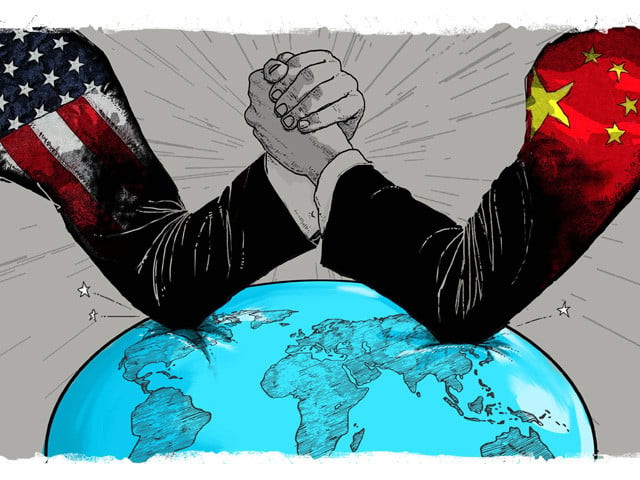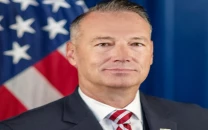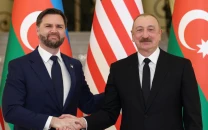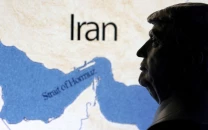Europe wants to wave goodbye to ‘US hegemony’
Experts say US has lost trust it once enjoyed from Europe amid Beijing’s busy diplomacy

As the US-led world order continues to experience vertiginous collapse, the European Union is hitting a reset button on its ‘lop-sided’ relations with its ally by charting its own independent course that is leading to Beijing – fundamentally altering a globe that recently appeared to have only an American gravity, pro or anti.
With Sino-European spirits rising with every move into new domains of influence and many world leaders flying to Beijing, ‘American hegemony’ is fading, and a power transition toward China is leading toward “a multipolar system”, experts have noted.
Speaking to the Express Tribune, Wang Yiwei, a professor at the Renmin University of China, said the US has lost the trust it had once enjoyed unreservedly from its transatlantic allies, a seismic shift he attributed to Washington’s uncertainty-marred domestic politics in addition to its questionable foreign policy.
“They [the EU nations] don’t trust the US anymore, and not just because of its foreign policy but also due to its turbulent politics at home that has grounded seeds of distrust among Europeans who are now left scratching their heads about the kind of policy the Americans will pursue next,” the professor reckoned.
Read more: How China’s rise is challenging the American global world order
He said the energy crisis and inflationary trend soaring skywards that caught many European countries off guard in the wake of the Ukraine crisis also thrust the US’ transatlantic allies into the process of introspection about their approach to China.
The comments from the esteemed professor came after French President Emmanuel Macron’s three-day trip to Beijing which concluded with him urging his European counterparts to wriggle themselves out of the American confrontational geostrategic ambitions.
The French president, however, stirred a commotion and hand-wringing from China sceptics around the western world for suggesting in an interview that Europe should not get dragged into a US-China confrontation over the Taiwan issue and that it should wean off its dependence on the US.
‘Sober awakening’
Political observers have noted that the shift also reflects a ‘sober awakening’ that China’s rapidly increasing share in the global trade and economy has started to endow ideological tensions with grace, pragmatism and the spirit of cooperation.
Professor Yiwei also noted that the US actively stoked the embers of conflict during the Ukraine crisis for which the EU had to bear the brunt and added that Europe – increasingly weary of US misadventures – was now explicitly signalling its desire to steer clear of the “strategic trap” staged to contain China’s rise on the global stage.
Explaining the rationale behind the emerging geopolitical configuration, the author pointed out that, unlike the US, Europe was willing to cooperate with China and author its foreign policy anew without the interference of any third party.
Also read: 'US weaponising human rights against China'
In his interview with Politico, Macron also warned of a “trap for Europe” if it got “caught up in crises that are not ours”, just as it was seeking to become more independent on security, defence and economic issues. If there was a conflict between the US-China “duopoly” then Europe “would not have the time or the means to build our strategic autonomy”. In that case, he argued, Europeans “would become vassals instead of a third pole if we had a few years to build it”.
“Is it in our interest to accelerate on the subject of Taiwan? No. The worst thing would be to think that we Europeans must become followers on this topic and adapt to the American rhythm and a Chinese overreaction,” he added.
Growing alarm
However, there was an air of unease coursing through the rest of the Western world after Macron’s statement which was viewed as a departure from the “de-coupling” narrative trumpeted by allies.
In a video posted on Twitter, US Senator Marco Rubio drew parallels with the conflict in Ukraine - on which Macron hopes to enlist the help of China.
If Europe doesn't "pick sides between the U.S. and China over Taiwan, then maybe we shouldn't be picking sides either [on Ukraine]," the Republican senator said.
Pascal Confavreux, spokesperson for the French embassy in the United States, said Macron's comments had been "overinterpreted".
"The US is our ally with whom we share our values," he said on Twitter.
However, welcoming the remarks, Wang Wenbin, spokesperson of China's Ministry of Foreign Affairs, said at a Monday briefing that China hopes all parties can recognise the essence of the Taiwan question, continue to stick to the one-China principle and oppose any form of Taiwan secessionist activities.
The biggest threat to cross-Straits peace is Taiwan secessionist activities and “US collusion with them”, said the spokesperson.
In his comments to The Global Times, Cui Hongjian, director of the Department of European Studies at the China Institute of International Studies, said that the US politicians' and media's discomfort reflected the US' rising anxiety over its hegemony, as well as its declining ability to rein in its allies.
"Some US media tend to use the term 'Gaullist' to criticize Macron. But in my view, Gaullism helped France break the antagonism during the Cold War, and won space for East and West; France and China," Cui said.
"France has made the right choice before. Given a second chance, it is still possible to make the right choice," he added.



















COMMENTS
Comments are moderated and generally will be posted if they are on-topic and not abusive.
For more information, please see our Comments FAQ